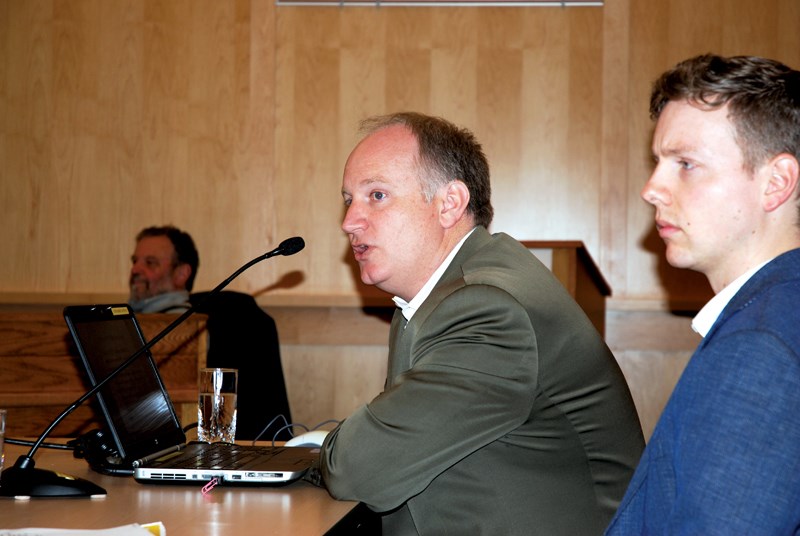The Sunshine Coast Regional District (SCRD) has delayed the start of curbside recycling in Halfmoon Bay and Roberts Creek and will instead give the public a chance to weigh in on the new Multi-Material BC (MMBC) stewardship program.
With that decision in the background, MMBC managing director Allen Langdon said he was concerned by SCRD directors’ “second thoughts” when he appeared before the infrastructure services committee April 24.
“You did sign a contract, right?” Langdon asked committee chair Lee Turnbull at one point, after Turnbull said the SCRD was still trying to figure out whether MMBC was a good idea.
“Yes, the SCRD did, for our depots,” Turnbull replied.
“When you say you have second thoughts, you did sign a contract and that kind of concerns me,” Langdon said.
Turnbull fired back that the SCRD was “pretty steam-rolled” into making a quick decision on the program. She also said Langdon, in his presentation, had implied that the Town of Gibsons and District of Sechelt “were somehow irresponsible” for not signing up with MMBC.
Langdon denied the charge.
Set to roll out province-wide on May 19, MMBC has reached agreements to provide depot services with Gibsons Bottle Depot and, under SCRD contracts, with Gibsons Recycling Depot, Sechelt Recycling Depot and Pender Harbour Recycling Depot.
In his presentation, Langdon noted the SCRD had also “accepted financial incentives and executed an agreement with MMBC to introduce a curbside program in electoral areas B and D.”
However, he said, the launch of the curbside program was delayed and the timing is uncertain after an April 10 SCRD board decision “to not implement a curbside request for proposals to select a sub-contractor.”
The board’s motion directs staff to conduct a mail-out survey of residents in areas B and D and hold information meetings on the program. The cost of the service will be one of the topics included in the public consultation.
During Langdon’s April 25 appearance, directors raised the issues of fines for co-mingled collection, the impact on small businesses and depot operators, and MMBC’s financial structure, with Turnbull saying she was confused by “how much of this is private and how much of it is actually going to be non-profit.”
MMBC, a not-for-profit agency whose board includes large multi-national printed-paper and packing (PPP) producers such as Unilever and Loblaw, has contracted post-collection services to Green By Nature, a joint venture involving three private-sector companies: Cascades Recovery, Emterra Environmental and Merlin Plastics.
Asked by Egmont/Pender Harbour director Frank Mauro if Green By Nature was a shell company, Langdon said: “It’s probably closer to say it’s a partnership.”
Mauro said the MMBC policies sounded progressive, “yet some of the agreements appear to be particularly onerous.”
Sechelt Indian Government District (SIGD) director Chris August said when the SIGD staff reviewed the contract, “the big thing that stuck out was fines.” As well, he said, MMBC’s “reporting was very strenuous. There’s a substantial number of reports to fill out and fines if reports aren’t filled out correctly.”
Langdon said the last point was incorrect — the only reporting for collectors was a single quarterly report logging customer complaints and steps taken to resolve them.
District of Sechelt director Darnelda Siegers, however, said the District’s lawyer did not agree with that interpretation of the contract.
On the MMBC agreement in general, Siegers said the District “ran it by our legal counsel and our legal counsel had concerns. We attempted to negotiate, but there was no negotiation.”
Regarding fines, Langdon said if more than three per cent of non-PPP material is present in loads, MMBC would give the collector one year to work on a remediation plan and so there would be no immediate fine.
The range of fines is based on the size of a community, he said, with the highest fine set at $5,000 per load.
With MMBC handling only residential PPP, Elphinstone director Lorne Lewis said in smaller population centres like the Sunshine Coast, that approach “sounds counterproductive. You’re making impediments and also inconvenience to small business,” he told Langdon.
Speaking from the gallery, Gibsons Recycling Depot co-owner Barb Hetherington said MMBC is paying depots $150 per tonne for plastic bags, with one tonne equal to 150,000 bags.
“The financial incentive you’re paying for these plastic bags does not cover even a day’s worth of labour,” she told Langdon.
Langdon said MMBC pays the transportation cost and takes the risk for commodity prices.
“We think the price is fair,” he said.
Answering concerns from Halfmoon Bay director Garry Nohr about glass being included for curbside pickup, Langdon said it is possible to have segregated glass collected, and that it’s being done in some communities on the Lower Mainland.



